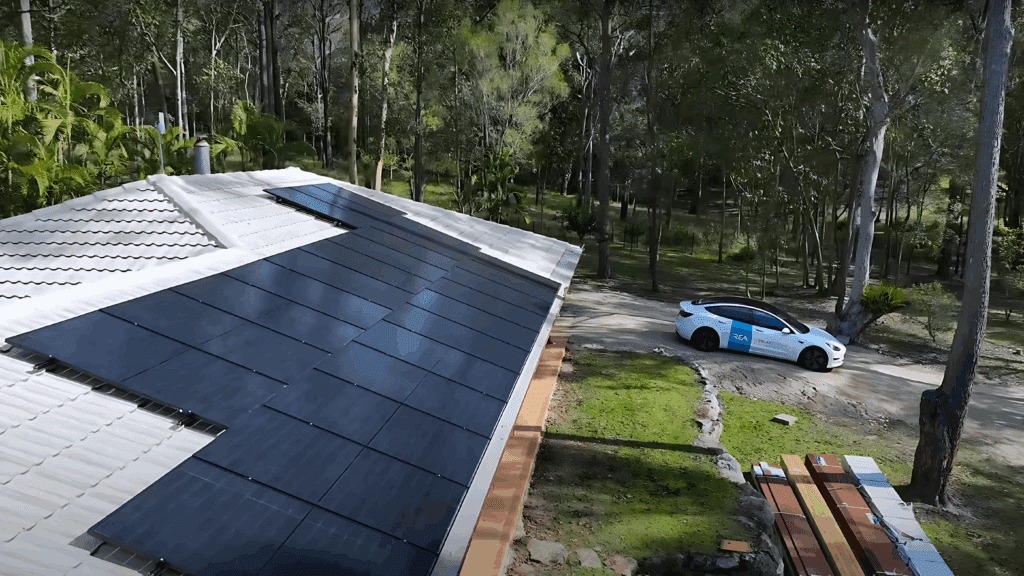ALL THE LATEST TIPS AND SOLAR NEWS
EXPLORE OUR BLOGS
SOLAR POWER MADE EASY
What Would You Like a Quote for?
Going Off Grid in Queensland: Is a Solar Power System Right for You?
With Queensland’s abundant sunshine and growing interest in energy independence, more homeowners and businesses are exploring the benefits of off grid solar power systems. These systems provide a sustainable solution for those looking to eliminate reliance on the traditional electricity grid. Whether you’re nestled in a remote rural area or simply seeking energy autonomy, an off grid solar system offers a tailored, efficient, and eco-friendly option.
Going off grid doesn’t mean sacrificing comfort or reliability. Thanks to advancements in technology, today’s solar setups are smarter and more accessible than ever before. This guide will walk you through the essentials—how the system works, what it costs, and whether it’s the right move for your Queensland property.
 These components work together to ensure a stable power supply, even during prolonged cloudy periods or overnight.
These components work together to ensure a stable power supply, even during prolonged cloudy periods or overnight.
What Is an Off Grid Solar System?
An off grid solar power system operates independently of the national electricity grid. It generates electricity using solar panels, stores excess energy in solar batteries Australia consumers trust, and supplies consistent power day and night. Unlike hybrid systems, which can fall back on grid power, a true solar off grid system must be self-sufficient. The typical system includes:- Solar panels to capture sunlight
- A solar battery system for energy storage
- An inverter to convert DC electricity to AC
- A backup generator (optional, but common)
 These components work together to ensure a stable power supply, even during prolonged cloudy periods or overnight.
These components work together to ensure a stable power supply, even during prolonged cloudy periods or overnight.
Why Queensland Is Ideal for Going Off-Grid
Queensland’s climate makes it an excellent candidate for solar energy. With an average of 8 to 9 hours of sunlight per day in many regions, properties can consistently generate ample solar power. Rural and regional areas particularly benefit from solar panel and battery systems due to limited access to grid infrastructure. In areas where connection to the grid is costly or unreliable, an off grid solar system can be the more economical and dependable choice. You’re not just buying a system—you’re investing in resilience and long-term cost savings.Cost Considerations and Payback Period
The upfront investment for an off grid system is higher than a typical grid-tied setup, primarily due to the inclusion of batteries for solar energy storage. A comprehensive residential system in Queensland may range from $20,000 to $80,000+ or more, depending on size and features. Commercial installations will naturally be higher, tailored to energy demands and operational needs. However, this initial cost is offset over time by eliminating electricity bills and avoiding connection fees. Government rebates and incentives can further reduce expenses. For many, the peace of mind and freedom from rising power costs are worth the investment alone. With proper sizing and energy management, many users report a 7–10 year payback period. After that, it’s essentially free power for years to come.Understanding Solar Battery Technology
A key component of any solar power system with battery storage is, of course, the battery. Modern lithium-ion batteries have revolutionised off grid living. They’re compact, durable, and capable of deep cycling, which means more usable energy per charge. When exploring options, it’s important to choose solar batteries that Australia residents have tested and reviewed positively. Look for units with a solid warranty (10 years is standard), high efficiency, and smart features like app monitoring. It’s also worth noting that battery capacity must match your usage. If your system is too small, you’ll frequently run out of power. Too large, and you’ll overspend without full utilisation. An experienced installer can help you strike the right balance.Choosing the Right Solar Installer
A successful off grid transition depends heavily on who installs your system. Search for solar installers near me with proven experience in off grid applications, not just general solar systems. Off grid configurations are more complex and require careful load assessment, design, and support. Ask your installer:- Have they worked on similar off grid projects?
- Do they offer system monitoring and after-sales service?
- Can they assist with approvals, permits, and rebates?
